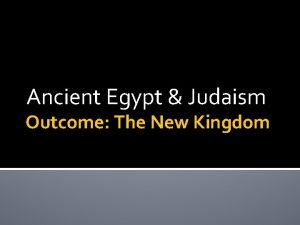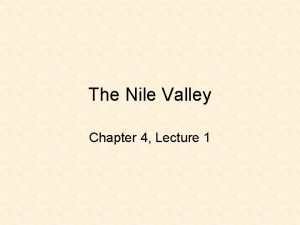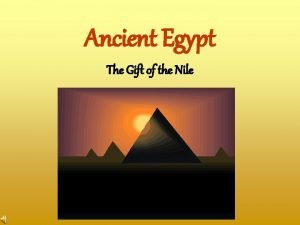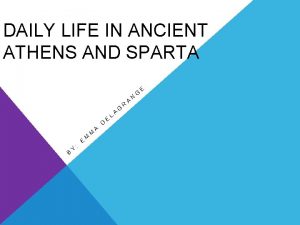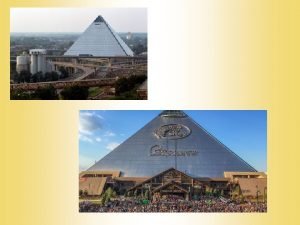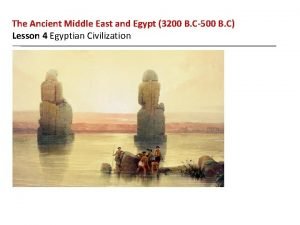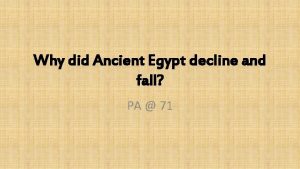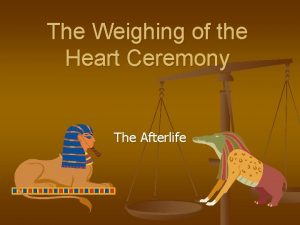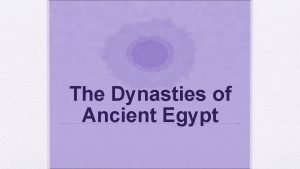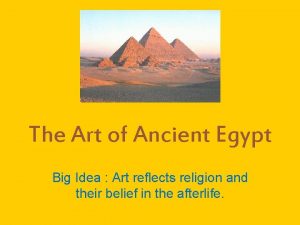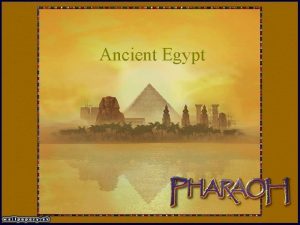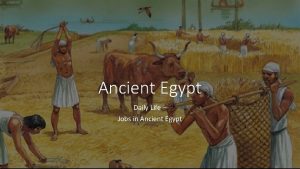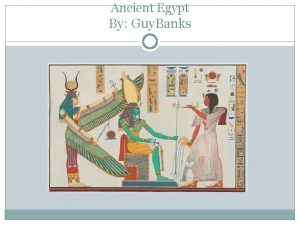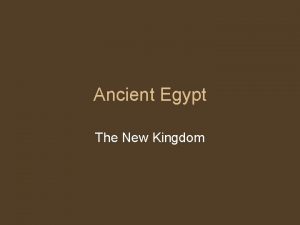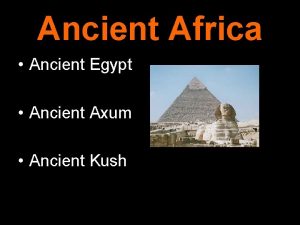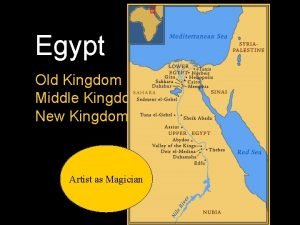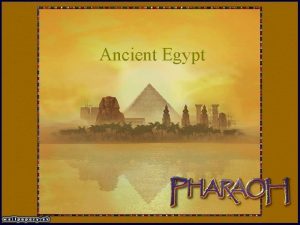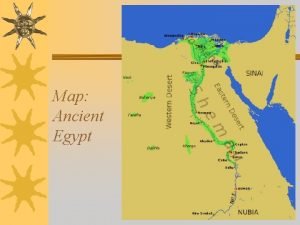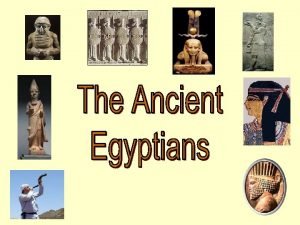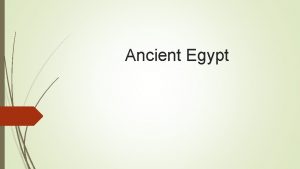Daily Life in Ancient Egypt The New Kingdom

















- Slides: 17

Daily Life in Ancient Egypt

The New Kingdom • Powerful & Stable • Ma’at- combination of ideas: harmony with the universe, justice, order, & peace • Must maintain ma’at for the world to remain safe & stable • To maintain ma’at: work hard, be a good person, live in harmony with one another • Pharaoh: rule wisely & well so order was maintained

The Hittite Empire • Lived in Anatolia (present-day Turkey) • Well-fortified capital • Expanded empire to West & South

The Hittites • Expansion was aided by their development of smelting iron – Swords & other weapons – Chariots

Your assignment

Adorning the Body • Light & simple clothing • Rich & poor, men & women work jewelry, dyed hair, wore wigs & make-up

Burial Practices • Believed in the afterlife, preserved the body • Wealthy Egyptians were mummified. - removed all organs but the heart, covered it in salt, 40 days later washed, oiled & wrapped body in fabric. Spread black gooey momia over the body • Poor Egyptians were wrapped in old clothing & buried in the ground

Crafts & Trade • Highly skilled- created furniture, jewelry, pottery • Taught their craft at a young age, went to school at the pharaoh’s palace • Traded grain, gold, copper, linen, gemstones, and minerals for timber, iron, silver, tin, and lead

Domestic Life • Married within social class. Girls- 12, Boys-14 • Upper class women oversaw the household, lower class women also cooked, cleaned, and helped in the field • Women had rights and were seen as equal to men in the eyes of the law • Children were allowed to play and be kids

• Food & Drink Most Egyptians spent a lot of time farming to grown vegetables, wheat, and barley, which they made into bread & beer. (Drank water & wine, too) • Very different based on class. • Upper class: Wide selection- meat and fowl (beef, pork, geese, ducks), vegetables (peas, beans, cucumbers, lettuce), cheese, cakes, fruit. • Lower class: simple meals-bread, vegetables, fish

Housing • Houses made of mud brick • Upper class- large homes, 2 stories tall, many rooms including bathrooms • Lower class- simple houses, few small rooms, narrow high windows & little furniture

Medicine • Doctors used parts of plants and herbs, such as garlic, in their treatments • Doctors treated injuries & wounds with bandages and stitches, but did not perform surgery • Relied on magicians to treat illness & to help women during pregnancy & child birth

Music & Dance • Performed at public & religious festivals, holidays, and feasts • Usually women, many were supported by the royal court and nobles • Variety of instruments- harp, lyre, flute, oboe, tambourine, drums

Religious Beliefs • Osiris- passed judgment on the souls of the dead • Anubis- helped prepare bodies of dead for afterlife • Priests and priestesses carried out rituals in temples to honor gods & goddesses • Commoners made offerings to gods and goddesses in their homes

Social Classes Pharaoh ---Royal Family, Nobles, Gov. Officials ----Priests ----Scribes ---Artists/Skilled Workers -----Laborers, Farmers During flood season, famers would work on the pharaoh’s building projects

Warfare • Army of full-time soldiers stationed throughout the empire to protect Egypt • In peacetime, soldiers dug canals or built pharaoh’s tombs • Mercenaries (soldiers from other lands who were paid to fight for Egypt) were sometimes part of the army • Variety of weapons : javelins, swords, shields, padded caps, chariots

Writing & Education • Scribes administered laws, collected taxes, recorded the grain & food supply, kept the census, measured the rise of the Nile & kept military records • Boys attended school for 12 years, often sunrise to sunset with strict teachers • Learned hieroglyphics and hieratic writing
 Ancient egypt and judaism outcome the new kingdom
Ancient egypt and judaism outcome the new kingdom Old kingdom middle kingdom new kingdom
Old kingdom middle kingdom new kingdom Old kingdom middle kingdom new kingdom
Old kingdom middle kingdom new kingdom Roman empire
Roman empire Mentohotep
Mentohotep Daily life in athens and sparta
Daily life in athens and sparta Upper egypt and lower egypt
Upper egypt and lower egypt Real life situation using polynomials
Real life situation using polynomials Social hierarchy ancient egypt
Social hierarchy ancient egypt Old kingdom egypt map
Old kingdom egypt map Why did ancient egypt fall
Why did ancient egypt fall What was the weighing of the heart ceremony
What was the weighing of the heart ceremony Roman floral history
Roman floral history Ancient egypt vocabulary words
Ancient egypt vocabulary words Frontalism egyptian art
Frontalism egyptian art British council introductions
British council introductions Specialized jobs in ancient egypt
Specialized jobs in ancient egypt artists use this perspective to show objects face-on.
artists use this perspective to show objects face-on.
